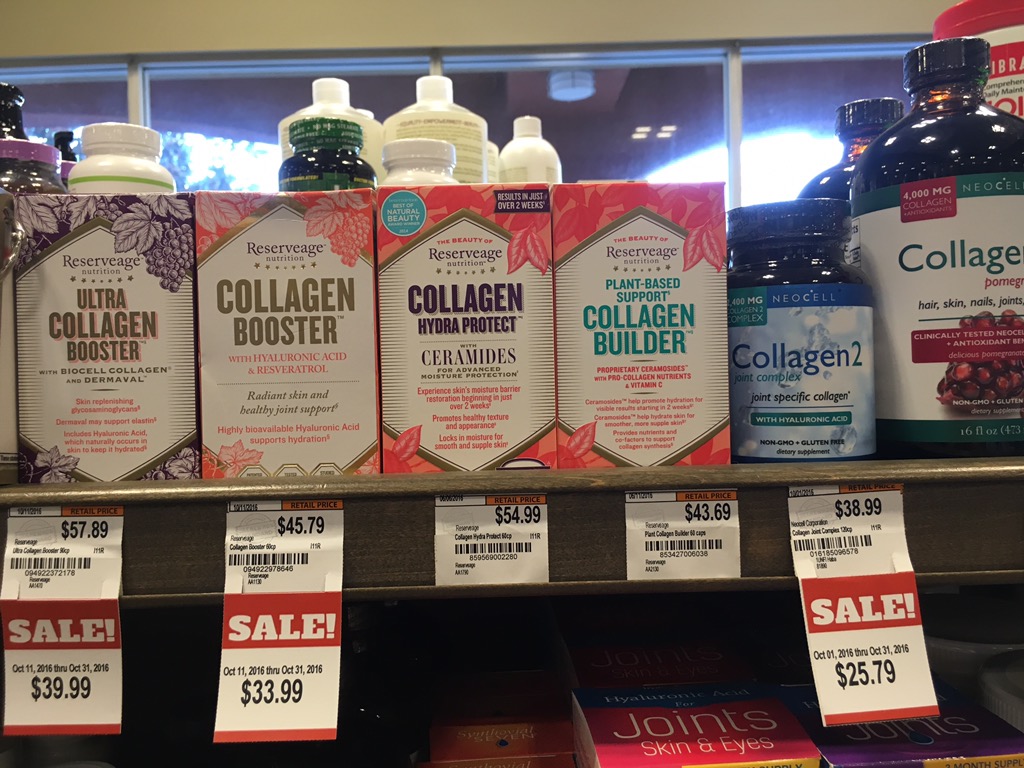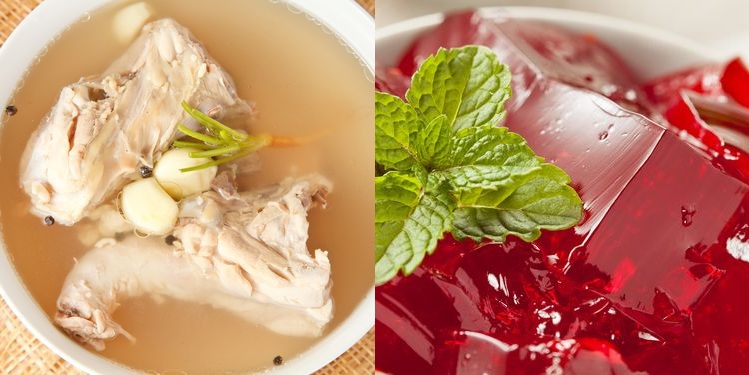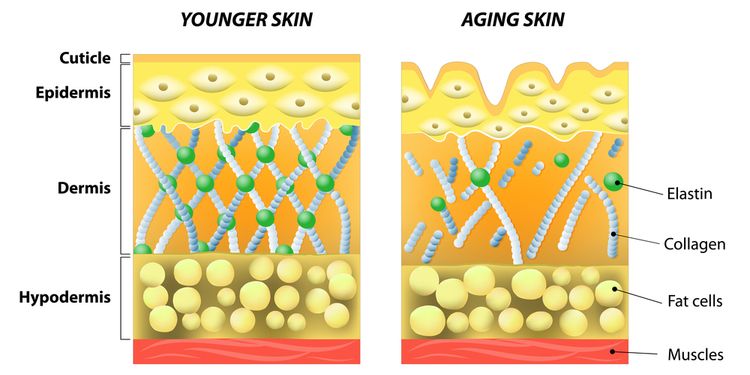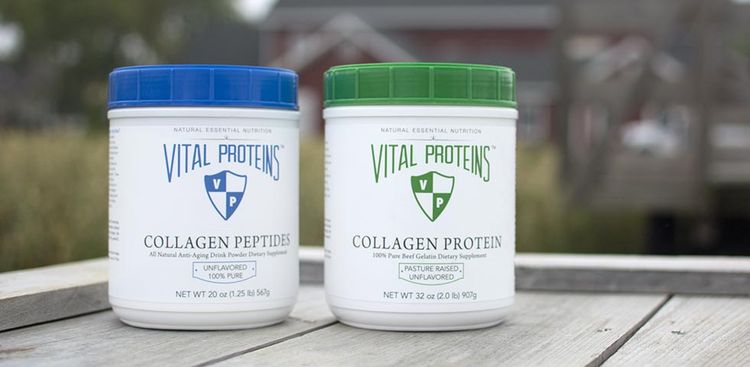Here’s Why Supplementing Collagen Is A Good Idea

You might have heard stories of celebrities using collagen to plump up their lips. Yes, there was indeed a time when collagen was used for lip injections and other “dermal filler” treatments. But as the title of this post implies, collagen has many more varied uses.
Collagen is a protein found throughout the human body. In fact, you’ve got more collagen in you than any other protein. It acts as a form of glue to hold your body together, and it can be found in your skin, muscles, tendons, and bones. It also assists in the process of shedding dead skin cells and helps your skin stay strong and elastic.
Your own body produces plenty of collagen, but as with so many things, production slows down with age, which is why taking it as a supplement could be a good idea.

Collagen vs. Gelatin
But first, it’s important to understand the difference between collagen and something with which it is often confused – gelatin. In terms of health benefits and protein profile, they’re the same. What differs is how they’re made and how they can be used.
Processed collagen hydrolysate (or collagen peptides), is made in such a way that allows it to easily dissolve in either hot or cold liquids, which gives you more options for getting it into your diet if you’re not interested in consuming the collagen-rich parts of animals (more on that later). The proteins are enzymatically hydrolyzed using a water process that breaks the bigger molecules down into smaller molecules, which is what enhances its dissolvability and digestibility.
Gelatin (or collagen protein), on the other hand, hasn’t been through that process, so its protein molecules are much bigger. As its name implies, gelatin forms a gel when mixed with hot water, and not everyone has an easy time digesting it.
When naturally occurring collagen breaks down, it turns into gelatin. If you’re cooking up some bone broth, those bones have tons of collagen in them, and the cooking process turns the collagen into gelatin. You can also get collagen and gelatin mixed together. It’s called collagelatin, and is helpful when cooking up things that need to be extra-chewy.

14 Benefits of Collagen
I said collagen can do amazing things for you, so here are 14 benefits you can experience by taking a collagen supplement:
1) Improves Skin: As less and less collagen is produced, the effects on the skin become depressingly clear— looseness, sagging, wrinkles, and less elasticity. Collagen keeps skin firm, smooth, and in good repair. Note that while many creams and lotions have collagen added, it’s not doing anything for you because the molecules are too big to be absorbed through your skin.
2) Improves Hair: The amino acids in collagen are also the basic building blocks for your hair, which means collagen is going to give you fuller, healthier-looking locks.
3) Good for Your Joints: Remember in The Wizard of Oz how the Tin Man was so stiff he couldn’t move until Dorothy found an oil can to loosen up his joints? Well, that’s very similar to what collagen can do for your joints. If you’re feeling like your joints are always stiff and swollen, collagen can help.

4) Improves Sleep Quality: Studies have shown that a few grams of glycine before bedtime translates into better sleep and less drowsiness during the day. Collagen is rich in glycine, so a nice warm mug of bone broth an hour or so before going to bed will do the trick.
5) Boosts Metabolism and Energy: Collagen has a lot of glycine in it, which plays a major role in your energy level because it helps deliver sugar into your body’s cells. The way it affects metabolism is by helping you build muscle; working muscles burn a lot more calories than fat.
Here’s the trick, though— for collagen to be converted into a protein your body can use, you’ve got to have lots of vitamin C, so combine it with your collagen supplement. That’s why early sailors were having problems with scurvy. They were getting plenty of collagen, but it was the lack of vitamin C that caused the trouble.
6) Can Help to Heal a Leaky Gut: Leaky gut is a problem for many people whose diets have been overloaded with highly processed foods. Over time, your gut becomes more porous than it should be, which allows toxins to pass through the wall of the gut and directly into your system. This can leave you feeling sick and exhausted all the time. Collagen helps repair your damaged gut.

7) Strengthens Teeth and Nails: When it comes to your nails and teeth, collagen protein is the go-to basic building block. If you suffer from nails that peel, crack, or split, collagen will help.
8) Reduces Cellulite and Stretch Marks: As your body’s collagen production capabilities decline and your skin begins to lose its elasticity, cellulite has nowhere to hide and becomes more visible. Keeping your collagen intake up will provide a smoother look to your skin without all those dimples in the places you don’t want them.
9) Reduces Wasted Food: The plain fact of the matter is that a cow is half muscle meat and half “other stuff” (bones, tendons, ligaments, cartilage, and other connective tissues). That “other stuff” is where all the collagen is, which means that when we don’t use it, we’re wasting an awful lot of rich, healthy food.

10) Reduces the Muscle Meat Required to Maintain Muscle Mass: If you make sure you get plenty of collagen in your diet and/or through supplements, you won’t have to use expensive protein supplements. Collagen has enough of the right amino acids to help you maintain muscle mass all on its own.
11) Increases the Safety of Eating Lots of Meat: If you’re a real meat-lover, collagen is your ticket to a long and happy life. If you eat a lot of meat, over time there can be serious negative health impacts. However, most of those can be wiped away merely by making sure you balance your muscle-meat intake with plenty of collagen. This helps explain why our ancient meat-loving ancestors weren’t dying from what many think are meat-induced diseases. They ate the whole animal, which meant they were naturally balancing the muscle meat and the collagen in their diets.

12) Speeds Up Injury Recovery and Wound Healing: If you experience a muscle, tendon, or ligament injury, get yourself on a collagen supplementation routine and see just how much it can aid in the recovery process. People who have done this say it is nothing short of amazing. It works by forming a kind of flexible covering over damaged tissues that continues to allow for movement. It helps close up wounds and is a pretty effective antibacterial.
13) Assists in Detoxing: The glycine in collagen helps your liver withstand the toxins that pass through it. For rapid liver and leaky gut repair, a bone broth detox over the course of several days can work wonders.
14) Enhances Food Flavor: There’s a reason why so many recipes over the ages have called for bone or meat broth. It’s delicious! Gelatin-rich stock is the go-to basic ingredient of all the great cooking traditions.

How to Add Collagen Into Your Life
Back when people ate most (if not all) parts of an animal, they naturally got more collagen than we do in modern times. Most of us don’t sit around gnawing on bones and tendons and such, although we’d be better off if we did. That’s why one of the best natural ways to get collagen is by making bone broth. It’s a great way to make use of something (chicken bones work well) that otherwise would go to waste.
Because collagen is easiest to obtain as an animal product, just make sure whatever source you’re using (including supplements) comes from pasture-raised animals without any chemicals or antibiotics. Also, keep in mind that just because an animal product is labeled “organic” doesn’t mean it was raised humanely.
Remember that for collagen to work its wonders in your body, it needs to be taken in conjunction with vitamin C and extra amino acids. If you are a meat-eater, any meats that require longer slow-cooking times are the ones richest in collagen— the non-steak cuts of meat. Also, any time you have the chance to eat the skin with your meat, do it. It’s practically pure collagen.
When choosing between collagen vs. gelatin, it may come down to practicality. Gelatin powders need hot water to make them dissolve, but collagen hydrolysate can be mixed into liquids at any temperature. Anyone with digestive problems is going to have an easier time with collagen hydrolysate than gelatin.

Choosing a Brand of Collagen to Buy
If you want to stick to brands that come from 100% grass-fed, pasture-raised, well-treated cattle, your main choices are Vital Proteins and Great Lakes. Some find that the Great Lakes brand has a smell and taste that seems odd to them. If that’s the case, then Vital Proteins will become your brand of choice. The packaging of the two brands is different, which might be the cause of the difference in taste and smell. The Vital Proteins powder comes in an airtight container, while the Great Lakes brand comes in a cardboard container that is not airtight, which means both air and moisture can get in there pretty easily, potentially degrading the product. Sticking to the high standard of grass-fed and pasture-raised necessarily carries a higher price tag than other products. Vital Proteins can only be ordered online, but shipping is always free. The price per ounce for its cold-water-soluble product is $1.85. The equivalent Great Lakes product runs $1.34/ounce. That’s a big difference, but the Great Lakes product does seem inferior in quality.
Summary
Collagen is the most abundant protein in the human body, but you probably aren’t getting enough of it to reap all the anti-aging health benefits it imparts. If you’re not up for getting it from the “other stuff” meat products or cooking your own bone broth, then collagen supplements are your path to a younger, healthier you.
